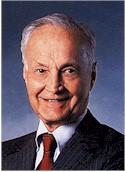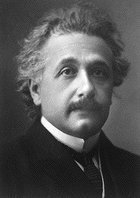 Investment Aphorisms1
Investment Aphorisms1 
John Bogle

Costs matter • Pretium Refert
My mission has been to change the industry so that our citizens - the human beings who invest in funds - get a fair shake. [From speech Changing the Mutual Fund Industry: The Hedgehog and the Fox Feb99.]
In investing, rely on the ordinary virtues that intelligent, balanced human beings have relied on for centuries: common sense, thrift, realistic expectations, patience, and perseverance. [From Common Sense on Mutual Funds]
Buy right and hold tight. [From Investing With Simplicity Jan99]
The easiest and surest way for a fund to achieve the top quartile in investment performance among peer funds is to achieve the bottom quartile in expenses. [From Common Sense on Mutual Funds]
The Prussian General Clausewitz has said, "the greatest enemy of a good plan is the dream of a perfect plan." And I believe that an index strategy is a good strategy. But many of you, I’m confident, seek a better plan, if not a perfect plan, no matter how great the challenge, no matter how overpowering the odds against implementing it with extraordinary success. [From The Dream of a Perfect Plan Oct99.]
...an extra percentage point of standard deviation (a rough proxy indeed for the elusive concept of risk) is meaningless, while an extra percentage point of long-term return is priceless. [From The Four Dimensions of Investment Return May98.]
Checking in at New York's Plaza Hotel a few years ago, Vanguard Chairman and CEO John Bogle asked for the cheapest room. The clerk suggested an "economy" single -- for $250. Bogle balked. After more suggestions and rejections, the exasperated clerk mentioned a windowless former broom closet for $89. "I'll take it!" Bogle said. He then apologized to the man behind him for the delay. "That's okay," replied the man, who happened to be a Vanguard shareholder. "You're Mr. Bogle, aren't you? Cheap? Right!"
Warren Buffett

To invest successfully over a lifetime does not require a stratospheric IQ, unusual business insights, or inside information. What’s needed is a sound intellectual framework for making decisions and the ability to keep emotions from corroding that framework. [From the preface to Benjamin Graham's The Intelligent Investor]
Most investors ... will find that the best way to own common stocks is through an index fund that charges minimal fees. Those following this path are sure to beat the net results (after fees and expenses) delivered by the great majority of investment professionals. [From 1996 Letter to shareholders]
By periodically investing in an index fund, for example, the know-nothing investor can actually out-perform most investment professionals. Paradoxically, when "dumb" money acknowledges its limitations, it ceases to be dumb. [From 1993 Letter to shareholders]
Charlie [Munger] and I would be glad to take any money management organization in the world managing more than $US10 billion and we would be willing to bet that their aggregate investment (performance) will be poorer than a no-load, very low cost index fund.
We do not have, never have had, and never will have an opinion about where the stock market, interest rates or business activity will be a year from now.
You only have to do a very few things right in your life so long as you don't do too many things wrong.
Stocks are simple. All you do is buy shares in a great business for less than the business is intrinsically worth, with managers of highest integrity and ability. Then you own those shares forever.
You should invest in a business that even a fool can run, because someday a fool will.
I will tell you the secret of getting rich on Wall Street. You try to be greedy when others are fearful, and you try to be very fearful when others are greedy.
I'd be a bum on the street with a tin cup if the markets were always efficient.
Success is getting what you want. Happiness is wanting what you get.
For more of Chairman Buffett's wit and wisdom see Annual Letters to Shareholders (of Berkshire-Hathaway Inc. BRK)
John Templeton

"This Time It's Different" are among the most costly four words in market history (March 1994)
The only investors who shouldn't diversify are those who are right 100% of the time (1983)
For those properly prepared in advance, a bear market in stocks is not a calamity but an opportunity (May 1962)
An investor who has all the answers doesn't even understand the questions (March 1994)
William Sharpe
1990 Nobel Laureate in Economics (with Merton Miller and Harry Markowitz)

Dr. Sharpe: The first thing to look at is the expense ratio; the second thing is the turnover rate; the third thing is some measure of past performance... But if you had to look at one thing only, I'd pick expense ratio.
Merton Miller
1990 Nobel Laureate in Economics (with Harry Markowitz and William Sharpe)

If you take money out of your left pocket and put it in your right pocket, you're no richer. Reporters would say, you mean they gave you guys a Nobel Prize for something as obvious as that [Modigliani & Miller theorem of corporate valuation]? And I’d add, Yes, but remember, we proved it rigorously. [From Investment Gurus by Peter Tanous.]
Albert Einstein
1921 Nobel Laureate in Physics • TIME Magazine's Person of the Century

Albert Einstein was once asked, "What is the most powerful force in the universe?"
He replied, "Compound interest."
Only two things are infinite, the universe and human stupidity, and I'm not sure about the former.
The intuitive mind is a sacred gift, and the rational mind is a faithful servant. We have created a society that honors the servant and has forgotten the gift.
The hardest thing in the world to understand is the income tax.
Miscellaneous quotes on indexing
-- Ted Cadsby [From: The Power of Index Funds, 1999]
The ultimate beauty of index funds is that they get you utterly out of the business of guessing what will happen next. They enable you to say seven magic words: "I don't know, and I don't care."
-- Jason Zweig [in money.com Aug01. From a followup e-mail to Jonathan Chevreau, "The corollary to the 'seven magic words' is: You must know that you do not care, and you must not care that you do not know. All in all, it is easier said than done. I doubt anywhere near even one-third of all investors have the emotional strength -- what Marcus Aurelius and Kierkegaard would call ataraxia -- to invest truly passively. On the one hand, that's a shame, since so many others could benefit from this strategy. On the other hand, it makes the truly passive approach far more lucrative for anyone who has the imperturability to persist with it."]
Benign neglect is, for most investors, the secret to long-term success in investing.
-- Charles D. Ellis [From: Winning the Loser's Game]
I'd compare stock pickers to astrologers, but I don't want to bad-mouth the astrologers.
-- Eugene Fama
Today the only people who don't think markets work are the North Koreans, the Cubans, and the stock pickers.
-- Rex Sinquefield
We all know that active management fees are high. Poor performance does not come cheap. You have to pay dearly for it.
-- Rex Sinquefield
I am no longer an advocate of elaborate techniques of security analysis in order to find superior value opportunities. This was a rewarding activity, say 40 years ago, when Graham and Dodd was first published; but the situation has changed. ... [Today] I doubt whether such extensive efforts will generate sufficiently superior selections to justify their cost. ... I'm on the "efficient market" school of thought.
-- Ben Graham, interviewed in 1976.
I'm too busy teaching and doing research to pay enough attention to more active trading.
-- Andrew Lo, MIT professor and author of A Non-Random Walk Down Wall Street on why he personally "invests by buying and holding index funds" [From MSN MoneyCentral Investor 21Jul00]
Peter Lynch, just after he retired from managing the Magellan Fund, as well as the legendary Warren Buffett, admitted that most investors would be better off in an index fund rather than investing in an actively managed equity mutual fund.
-- Burton Malkiel in A Random Walk Down Wall Street
Markets can remain irrational longer than you can remain solvent.
-- John Maynard Keynes
A man is incapable of comprehending any argument that interferes with his revenue.
-- René Descartes
It is difficult to get a man to understand something when his salary depends on his not understanding it.
-- Upton Sinclair
The superior man understands what is right; the inferior man understands what will sell.
-- Confucius
Q. You've said that investing in an actively managed fund (as opposed to a passively run index fund) is an act of faith. What do you mean?
A. Under normal circumstances, it takes between 20 and 800 years [of monitoring performance] to statistically prove that a money manager is skillful, not lucky.
Q. Hold it. Did you say 800 years?
A. That's right. To be 95 percent certain that a manager is not just lucky, it can easily take nearly a millennium-which is a lot more than most people have in mind when they say "long-term." Even to be only 75 percent sure he's skillful, you'd generally have to track a manager's performance for between 16 and 115 years. Now let's say you finally get to the point, after 20 years or something, where you can say to us, "OK, Ted, Kevin, Martha, you're it, you're great, you really do have skill." Then the whole thing changes. I retire, Kevin loses his mind, Martha becom es an alcoholic, we sell our firm to United Asset Management and take on $10 billion when we can only manage $2 billion.
Q. You're kidding, I hope.
A. I'm kidding about our firm, but retail investors need to know how the money management business really works. It's a stacked deck. The game is unfair.
...
Q. Do you invest in your fund?
A. All of my family's retirement money is in the fund. But because the fund trades a lot, it's not suitable for taxable investments. So all of our taxable money is elsewhere.
Q. Where?
A. In Vanguard index funds. I've owned Vanguard Index 500 for 23 years. [in 1999...Bylo]
Q. You're an active fund manager who has nearly all his money in index funds?
A. Once you throw in taxes, it just skewers the argument for active management. Personally, I think indexing wins hands-down. After tax, active management just can't win.
-- Ted Aronson [Interviewed by Jason Zweig in money.com Feb99 and by Jonathan Burton in Marketwatch Jan07.]
I have personally tried to invest money, my client's and my own money, in every single anomaly and predictive result that academics have dreamed up. And I have yet to make a nickel on any these supposed market inefficiencies. An inefficiency ought to be an exploitable opportunity. If there's nothing investors can exploit in a systematic way, time in and time out, then it's very hard to say that information is not being properly incorporated into stock prices. Real money investment strategies don't produce the results that academic papers say they should.
-- Richard Roll [Financial economist and principal of the portfolio management firm, Roll and Ross Asset Management, Wall Street Journal, December 28, 2000]
Advice from an active mutual fund manager, who charges a 2.6% MER to sit on cash, to investors who are unable to value stocks like Buffett or who can't find mutual fund managers who adhere to that approach: They "may as well use high-quality bonds and index funds, where at least they don't pay high fees. I'll go further. Indexing is a good alternative to most of the junk that's out there." [Of course anyone can hire Buffett directly. Just buy shares of BRK.b and hold them "forever." The "MER" is a mere 0.02%, the tax efficiency is 100% and the value is "priceless." ...Bylo]
-- Larry Sarbit [Jonathan Chevreau in Cash still king for Sarbit, Financial Post, 07Mar03]
The LTCM risk model told them that the loss they incurred on one day at the end of August 1998 should have occurred once every 80 trillion years. It happened again the following week.
-- Sir Howard Davies, Chairman of the Financial Services Authority, UK
Investing should be dull. It shouldn't be exciting. Investing should be more like watching paint dry or watching grass grow. If you want excitement, take $800 and go to Las Vegas.
-- Paul Samuelson, Nobel-prize winning economist in The Ultimate Guide to Indexing
Anonymous
The best time to invest is when you have the money.
Pigs get fat. Hogs get slaughtered.
No plan fails.
1From dictionary.com:
aph·o·rism
noun
1. A tersely phrased statement of a truth or opinion; an adage.
2. A brief statement of a principle.